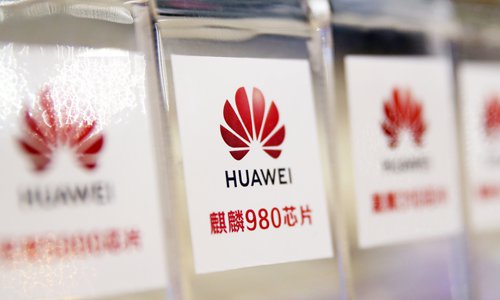Huawei smartphones equipped with Kirin chipset see price hikes amid supply concerns

Huawei showcases the Kirin 980 chip along with other devices at the South & Southeast Asia Commodity Expo and Investment Fair in Kunming, Southwest China's Yunnan Province in June, 2019. Photo: IC
Huawei's high-end smartphones equipped with its self-developed Kirin chipset have seen price hikes in non-franchised stores, a source familiar with the matter told the Global Times on Monday.
An employee of a Shenzhen-based dealer who spoke on condition of anonymity said that the price of a Huawei Nova 7 SE, a high-end smartphone that uses the HiSilicon Kirin 820 5G chipset, has risen by 100 yuan this week due to the "impact from market fluctuations."
"There will be a price surge soon," the employee noted.
Due to the inventory shortage of Huawei's Kirin chips, prices of the Huawei Mate, P40, and Nova series have also increased, according to a report by domestic news outlet nbd.com.cn, citing sources from Huaqiangbei, an electronics parts market in Shenzhen, South China's Guangdong Province.
At a Huawei flagship store in Shenzhen's Nanshan district, the Global Times noticed that the price of Huawei handsets is the same as the pricing on Huawei's official website.
A salesperson in a Huawei authorized store in Beijing told the Global Times on Monday that there has been no official price hike for any model.
However, "due to the supply shortage, the products sold by [non-authorized dealers] have seen price hikes," said a Huawei salesperson, according to the nbd.com.cn report.
The report also cited a merchant based in Huaqiangbei who claimed that prices of Huawei's high-end smartphones equipped with Kirin chips have generally gone up by 300 yuan, and some distributors have begun to stock up on Huawei phones.
A Chinese consumer surnamed Li told the Global Times on Monday that "if Huawei's smartphones that come powered by the flagship Kirin chip cannot be bought someday in the future, it is worth having one for the collection."
The market fluctuation came after a senior executive of Huawei announced recently that the Mate 40 could be the last smartphone to be equipped with a Kirin processor.
The much-expected Mate 40 smartphone is set to be released in September this year.
Richard Yu Chengdong, chief executive of the company's consumer business group, said earlier in August during a China Info100 summit that the Kirin series of chips will not be produced after September, and Huawei's Mate 40 will become an "out of print" mobile phone with high-end Kirin chips.
Amid the US government's further crackdown on Huawei by preventing the Chinese telecommunications giant from obtaining semiconductors without a special license - including chips made by foreign firms that have been developed or produced with US software or technology - Huawei has been actively seeking a way out.
TSMC, the Taiwan-based semiconductor foundry, said it did not take any new orders from Huawei after May 15, and their final shipment to Huawei will have been completed by September 14.
Despite the supply pressure, Huawei surpassed Samsung for the first time to become the world's largest smartphone company in terms of shipments in the second quarter of 2020, according to data released by Canalys. With shipments of 55.8 million units, Huawei took the largest global market share of 19.6 percent, ahead of Samsung and Apple.


